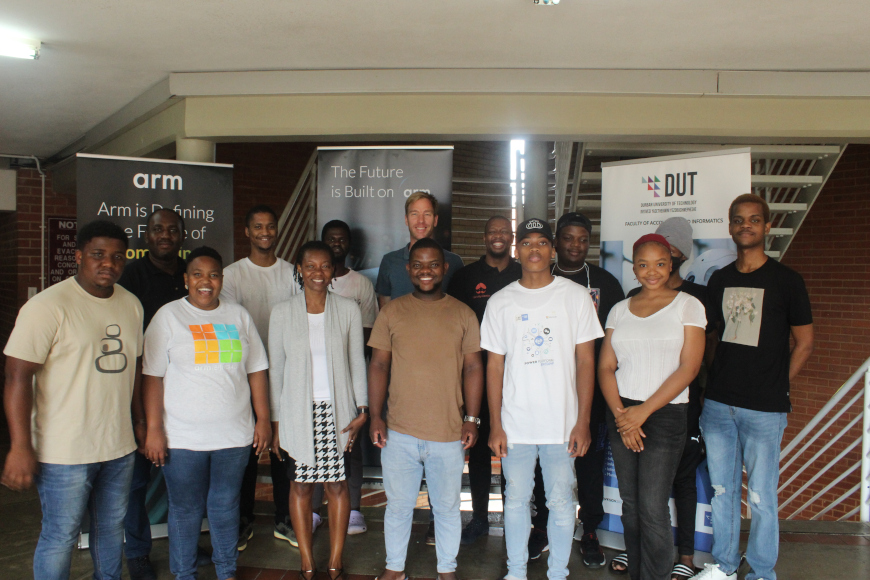The Durban University of Technology’s (DUT’s) Media, Information and Communication Technologies Sector Education and Training Authority (MICTSETA 4IR Centre of Excellence) for Postgraduate Student Training recently held a hands-on workshop training course based on an open source framework (https://github.com/flotter/iot-framework) for building IOT products.
4IR Faculty Technician and engagement Facilitator at the Faculty of Accounting and Informatics, Fanie Ndlovu, expressed what a great pleasure it is to see DUT becoming the gateway in South African higher education for multinational companies to invest and to empower Africa.
“I was excited when Arm approached our Faculty of Accounting and Informatics through their ecosystem partner Robert John who is based in Nigeria to pilot an initiative of one of their ecosystem partners (Fred) from Cape Town. It is amazing that a person from Nigeria approached DUT for a Cape Town person to pilot the initiative at DUT. This significantly demonstrates how ENVISION2030 placed the DUT brand at international stage. This initiative is aligned to an ‘Engaged University’ strategic perspective,” he said.
The course instructor was Frederik Lotter. He was born and lived in South Africa, but I spent nine years working for ARM Ltd. in Cambridge (UK) after completing an Electronic Engineering Degree at the Stellenbosch University.
“I have spent most of my career after ARM working on embedded products based on ARM processors, RTOS or Embedded Linux operating systems. Right now I am working for Canonical as a software developer in one of the Ubuntu Core teams,” he said.
Lotter explained further on the course saying that he and his brother had written and presented a similar course in various capital cities in Africa in 2013 during a road trip from the United Kingdom to South Africa.
“I am sure similar courses and tools exist, and many of those alternatives may be more suitable for real products, especially mission critical environments which require strict security. However, often these courses and the underlying tools are expensive, or require expert knowledge of the technology stack, which makes it hard for newcomers to use as a learning platform,” he added.
He also indicated that DUT were extremely quick to offer their help in hosting the course and provided excellent facilities perfectly suited for the practical sessions he wanted to run.
“I believe the students really enjoyed it. They seemed very engaged throughout the day, and the discussions we had were really interesting. Every group ended the day with a functional IOT system, so I was really proud of them,” said Lotter.
Lotter expressed that this course was a proof of concept, and given the success it is likely that they can repeat something similar in the future
“I have to thank Fanie Ndlovu for spending hours of his time late in the evening making this course possible on such short notice. It was an absolute pleasure to work with him,” he said.
Stephen Ozoigbo, Senior Director, Emerging Economies at Arm explained the company’s role in supporting the event, saying that it was because of the company’s strong desire for regional ecosystem partnerships that amplify its mission towards catalysing learning institutions, start-ups and developer communities.
“We count DUT as an esteemed regional partner, and we are confident that the DUT computing ecosystem will continue to build on Arm,” he said.
Ozoigbo further conveyed Arm’s plan in Africa and why DUT is vital in terms of helping Arm.
“Arm’s regional plan in Africa includes the support of digitisation initiatives across targeted countries. We recently launched a network of Arm (E3)NGAGE labs focused on engaging, educating, and cultivating local technology ecosystems while making Arm a central pillar of the computing ecosystems across these regions,” he added.
Going forward, the forthcoming projects Arm is working on with DUT includes DUT in their lab network and Ozoigbo indicated that they also look forward to building more communities of practice within DUT, that utilise Arm Education resources to increase the awareness and prominence of Arm technologies and enable a generation of technologists, start-ups and ecosystem leaders to build local products and solutions for Africa, on Arm.
Ndlovu thanked the Executive Dean of the Faculty of Accounting and Informatics: Professor Oludayo Olugbara, for creating an environment that allows staff and students initiatives to strive.
“The outcome of that is attracting big companies such as Arm,” commented Ndlovu.
Pictured: DUT students at the Workshop.
Waheeda Peters


